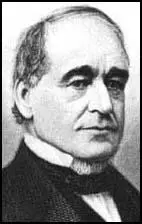Hannibal Hamlin

Hannibal Hamlin was bornin Oxford County, Maine, on 27th August, 1809. He worked on the family farm before being employed as a compositor in a printing office. He also worked as a surveyor and school teacher before studying law and being admitted to the bar in 1833.
A member of the Democratic Party, Hamlin was elected to Maine's House of Representatives in 1836 and served as speaker in 1837, 1839 and 1840. Hamlin was elected to the 28th Congress in 1842 and the 29th Congress in 1844 where he served as chairman of the Committee on Elections.
A member of the anti-slavery wing of the Democratic Party, Hamlin was defeated in 1846 but returned in 1848 where he served as chairman of the Committee on Commerce and the Committee on Printing.
Unhappy with his party's views on slavery, and after the passage of the Kansas-Nebraska Act, Hamlin joined the Republican Party. After a short period as governor of Maine, Hamlin returned to the Senate in March, 1857. In 1860 the Republican Party nominated Abraham Lincoln as its presidential candidate. Hamlin was selected as his running mate.
Lincoln won the presidential election with with 1,866,462 votes (18 free states) and beat Stephen A. Douglas (1,375,157 - 1 slave state), John Beckenridge (847,953 - 13 slave states) and John Bell (589,581 - 3 slave states). Between election day in November, 1860 and inauguration the following March, seven states seceded from the Union: South Carolina, Mississippi, Florida, Alabama, Georgia, Louisiana and Texas.
During the American Civil War Hamlin loyally supported Abraham Lincoln. However, in 1864 leading members of the Republican Party began to suggest that Lincoln should replace Hamlin as his running mate in the presidential election. Hamlin was a Radical Republican and it was felt that Lincoln was already sure to gain the support of this political group. It was argued that what Lincoln needed was the votes of those who had previously supported the Democratic Party in the North.
It was decided that Andrew Johnson, the governor of Tennessee, would make the best candidate for vice president. By choosing the governor of Tennessee, Lincoln would emphasis that Southern states status were still part of the Union. He would also gain the support of the large War Democrat faction. At a convention of the Republican Party on 8th July, 1864, Johnson received 200 votes to Hamlin's 150 and became Lincoln's running mate. This upset Radical Republications as Johnson had previously made it clear that he was a supporter of slavery.
Hamlin returned to the Senate in 1869 and served as chairman of the Committee on the District of Columbia (41st Congress), Committee of Manufactures (42nd Congress), Committee on Mines and Mining (42nd and 43rd Congresses), Committee of Post Offices and Post Roads (44th and 45th Congresses) and Committee on Foreign Relations (45th Congress). Hannibal Hamlin died in Bangor, Maine, on 4th July, 1891.
Primary Sources
(1) In 1864 Abraham Lincoln sent Simon Cameron to see Benjamin F. Butler at Fortress Monroe.
Simon Cameron, who stood very high in Mr. Lincoln's confidence, came to see me at Fortress Monroe. He spoke with directness. "The President, as you know, intends to be a candidate for re-election, and as his friends indicate that Mr. Hamlin should no longer be a candidate for Vice-President, and as he is from New England, the President thinks his place should be filled by someone from that section. Besides reasons of personal friendship which would be pleasant to have you with him, he believes that as you were the first prominent Democrat who volunteered for the war, your candidate would add strength to the ticket, especially with the War Democrats, and he hopes that you will allow your friends to co-operate with his to place you in that position."
"Please say to Mr. Lincoln," I replied, "that while I appreciate with the fullest sensibilities his act of friendship and the high compliment he pays me, yet I must decline. Tell him that I said laughingly that with the prospects of a campaign before me I would not quit the field to be Vice-President even with himself as President, unless he would give me bond in sureties in the full sum of his four years' salary that within three months after his inauguration he will die unresigned.
